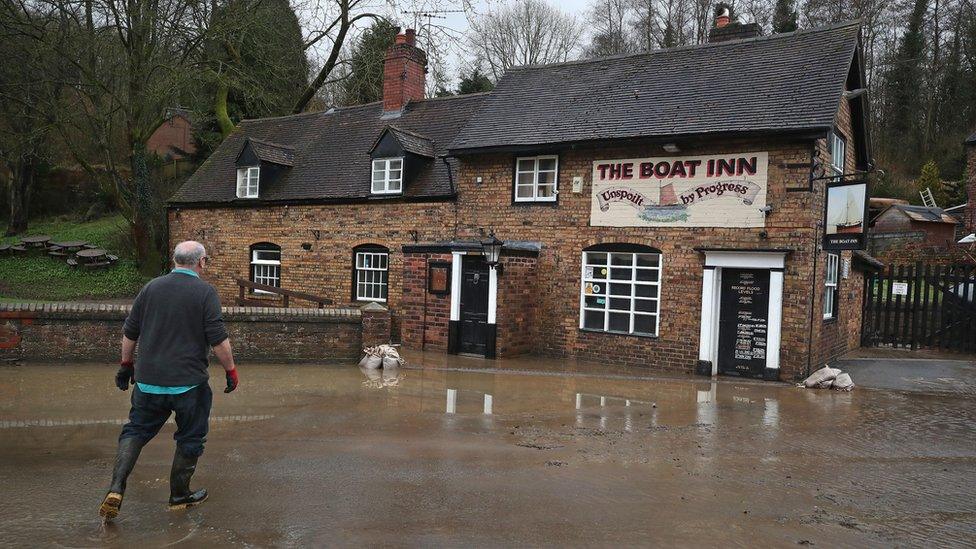Should London become a 'sponge city'?
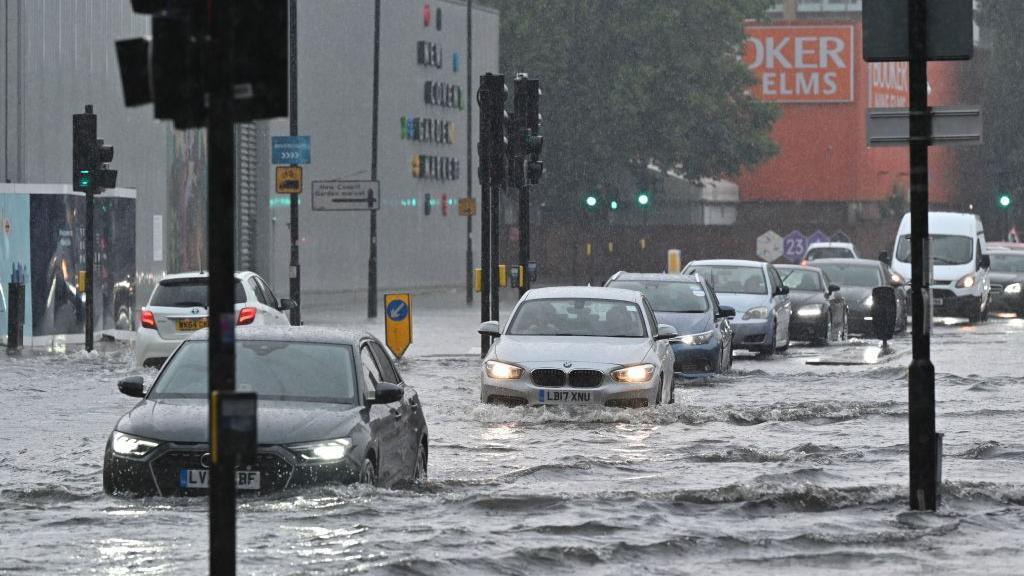
Flash flooding is predicted to increase as a result of climate change
At a glance
The Greater London Authority (GLA) identified flash flooding as a major risk to the capital going forward
The Met Office warns that storm events such as one that caused damaging flash flooding in 2021 will be four times more frequent if emissions remain high
The "sponge city" concept used by some Chinese cities has been put forward as a solution and involves using green spaces like parklands and blue spaces like lakes and rivers to absorb rainwater
But implementation in London could be hampered by high costs and a lack of space
- Published
Flash flooding has been described as the main environmental risk to people living in the capital by the Greater London Authority (GLA). One solution put forward is that London should become a "sponge city" - an urban area designed to absorb and hold rainwater. How would this work?
"It was very sudden, it was scary, financially damaging and deeply unpleasant."
Alex Barwise was working at Audio Gold record shop in Muswell Hill in July 2021, when heavy downpours battered London, damaging thousands of properties, flooding dozens of Tube stations and even causing patients to be evacuated from hospital wards.
Audio Gold was left about a foot deep in water, Alex says, with thousands of pounds' worth of records and equipment destroyed.
"We went through a few hours of trying to save what we could, in the dark. It was scary at the time, but thankfully everyone was OK."
In the aftermath of the flooding, City Hall created the Surface Water Strategic Group, external to prepare a London-wide flooding strategy - something that’s set to be announced later this year.
It will follow a report, external released in January by the London Climate Resilience Review, which found the capital was "underprepared" for climate change and called surface flooding a "lethal" risk to all.

It took more than a month for Audio Gold to become fully operational following the flooding
Surface flooding happens when large amounts of rain fall on hard, impervious surfaces such as concrete, overwhelming the local drainage system. Add more rain and the system backs up, leaving water to pool on roads and pavements.
Prof Lizzie Kendon from the Met Office told BBC London that "as the climate warms we expect more intense rainfall" and said the period from October 2023 to March 2024 was the wettest half-year on record.
She warned that storms capable of causing flash flooding "are expected to be four times more frequent in the future under a high-emission scenario".
What is a sponge city?
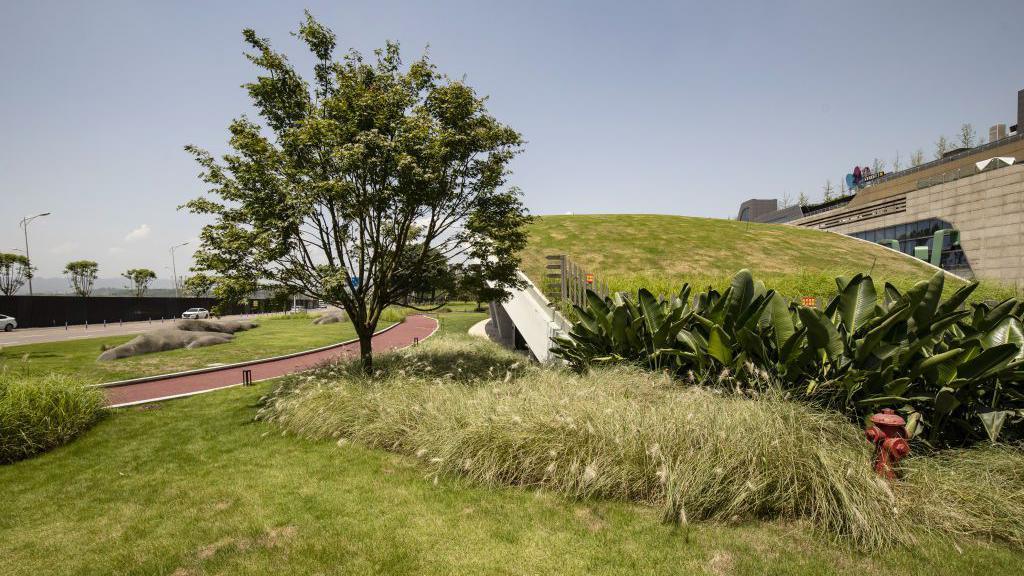
A site in Chongqing, one of 30 pilot sponge city projects launched by China in 2013
A sponge city is designed to absorb rainwater to mitigate flooding by using green spaces like parks and wetlands and blue spaces like ponds and rivers to lower the amount of excess rainwater entering the sewerage system.
The idea is that this prevents the need to remove water with large-scale infrastructure such as sewage pipes.
One of the pioneers is China, which in 2013 made sponge cities part of a multibillion-dollar national policy after experiencing substantial flash flooding.
As well as helping with flood prevention, sponge cities have been found, external to provide wider benefits, such as more community green spaces, better air and water quality and improved biodiversity.
Sewerage and rainwater are often carried in the same pipes in the UK. When there's heavy rainfall the system can be overwhelmed, leading to overflows of wastewater into our waterways. These can cause significant pollution.
From cities with more than a million residents like Auckland in New Zealand to small "sponge towns, external" in Kenya, many places have used the concept to try to tackle surface flooding.
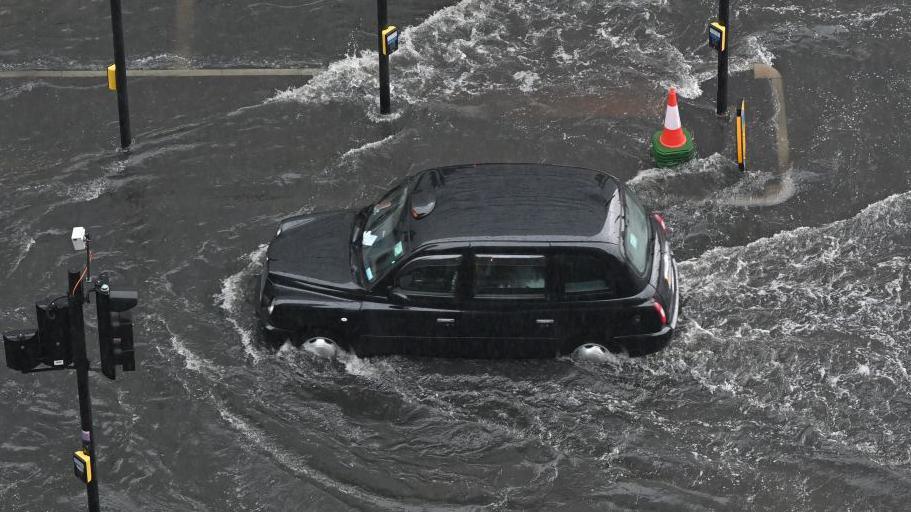
The floods of July 2021 caused significant damage and disruption
How spongy is London?
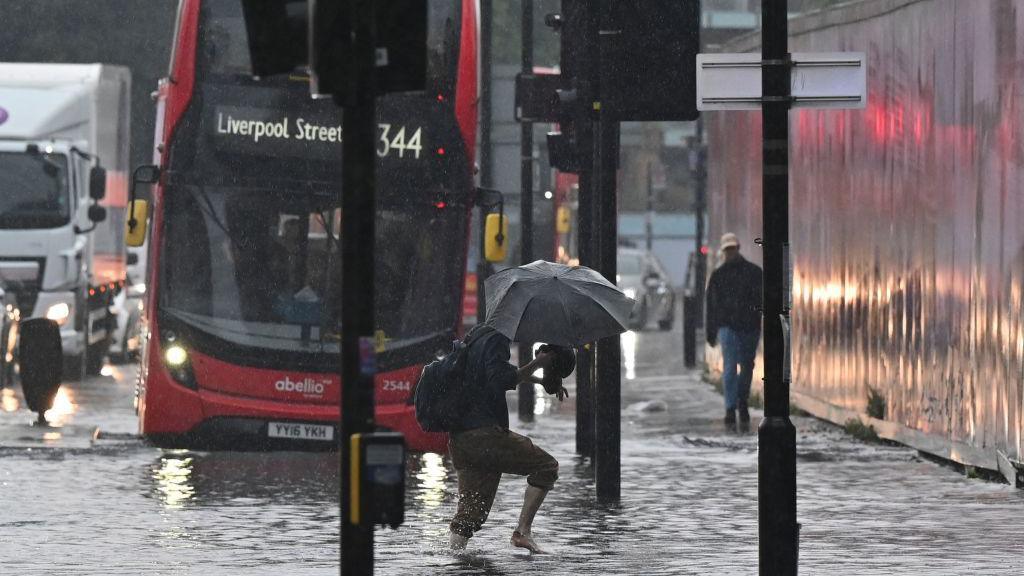
Research by the insurance firm Zurich UK found more than 40% of London's 301,000 commercial properties were at threat from torrential rainfall
What constitutes sponginess is difficult to quantify.
London has an array of green spaces and there are an estimated 8.4 million trees, external in the capital, but it's also heavily urbanised.
In 2022, British development firm Arup tried to work out London's sponginess by using computer modelling.
The subsequent report, external compared London with seven other cities: Auckland, Mumbai, Nairobi, New York, Shanghai, Singapore and Sydney.
It found London was the second-least spongy, with a rating of 22% - only beating Sydney's 18%.
Behind the report was Arup's global water business lead, Mark Fletcher, who believes London should strive to become a sponge city.
Mr Fletcher told BBC London it was "just good common sense", adding that flood management in London is "a patchwork of liability and responsibility allocation".
He welcomes the formation of the Surface Water Strategic Group, noting that "there is progress in the right direction and all the key parties are getting around the table".
While Arup's results show London performing poorly, professor of urban geography at Coventry University Susanne Charlesworth said the study didn't factor in "the age of the city, geographical location and whether there were informal settlements".
"I'm glad they've called it a snapshot", she added, highlighting how the highest-ranked cities were also the youngest.
What are sustainable drainage systems?
Alongside having green areas such as parks, wetlands and woodlands, a key element of any sponge city is the use of sustainable drainage systems (SuDS).
SuDs is a wide-ranging term for local-scale projects designed to manage excess rainwater. These are an alternative to big construction projects, such as the new London super sewer, and have associated secondary benefits such as creating community spaces, promoting biodiversity and lowering water pollution.
SuDS can be built as part of a new development or retrofitted into an existing space, with dozens of different types, external - as can be seen already in London:
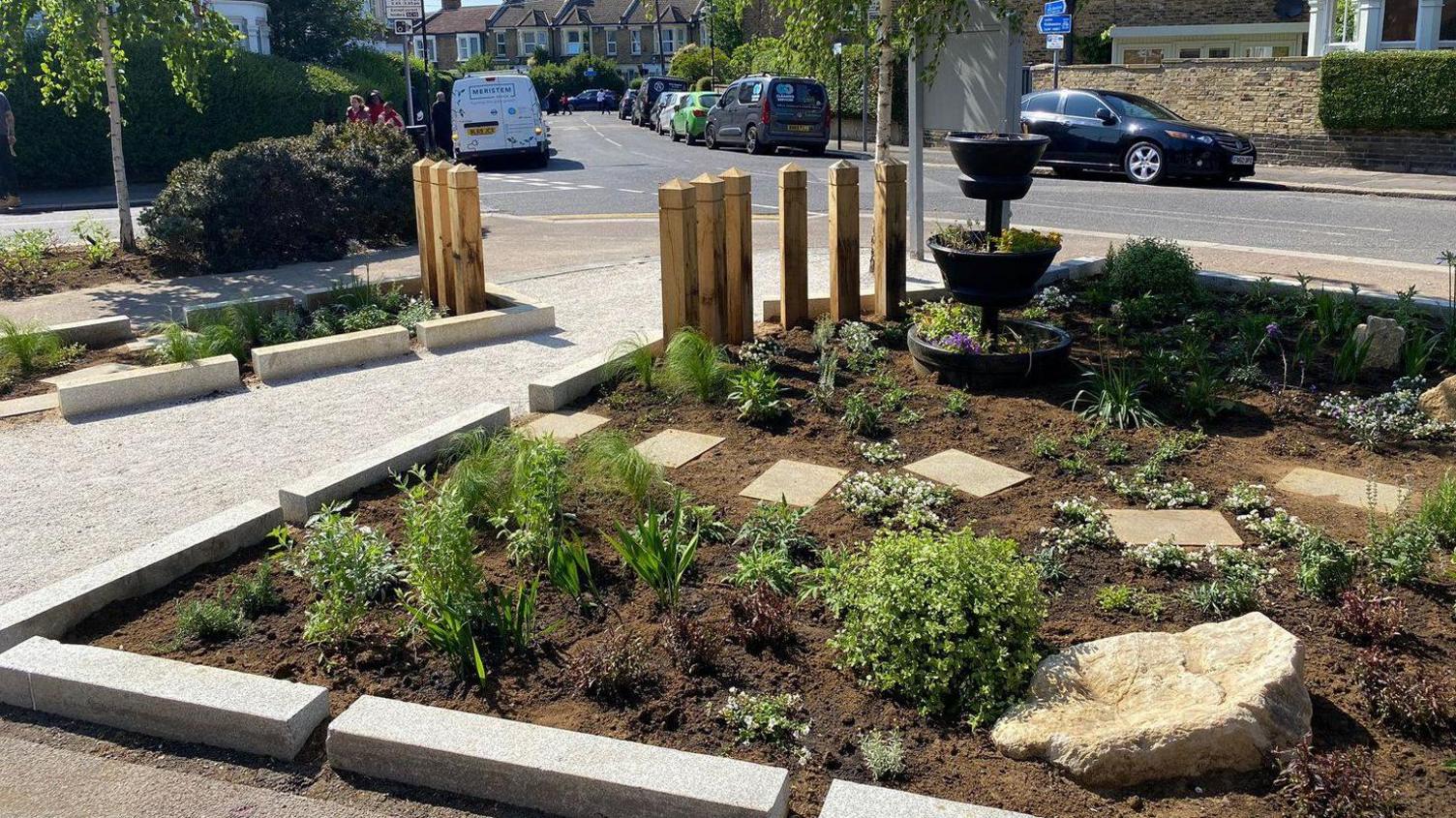
Rain gardens in Waltham Forest provide small basins that capture, store and filter rainwater. This lowers the surface runoff into sewers and drains
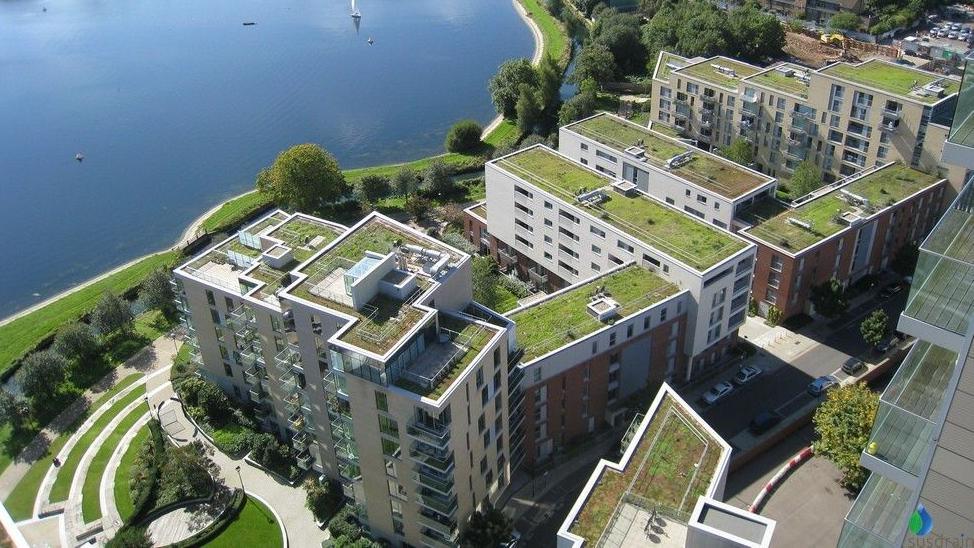
Green roofs - like these in Hackney, east London - are designed to intercept and hold rain, reducing the volume of runoff and reducing the impact of heavy rain
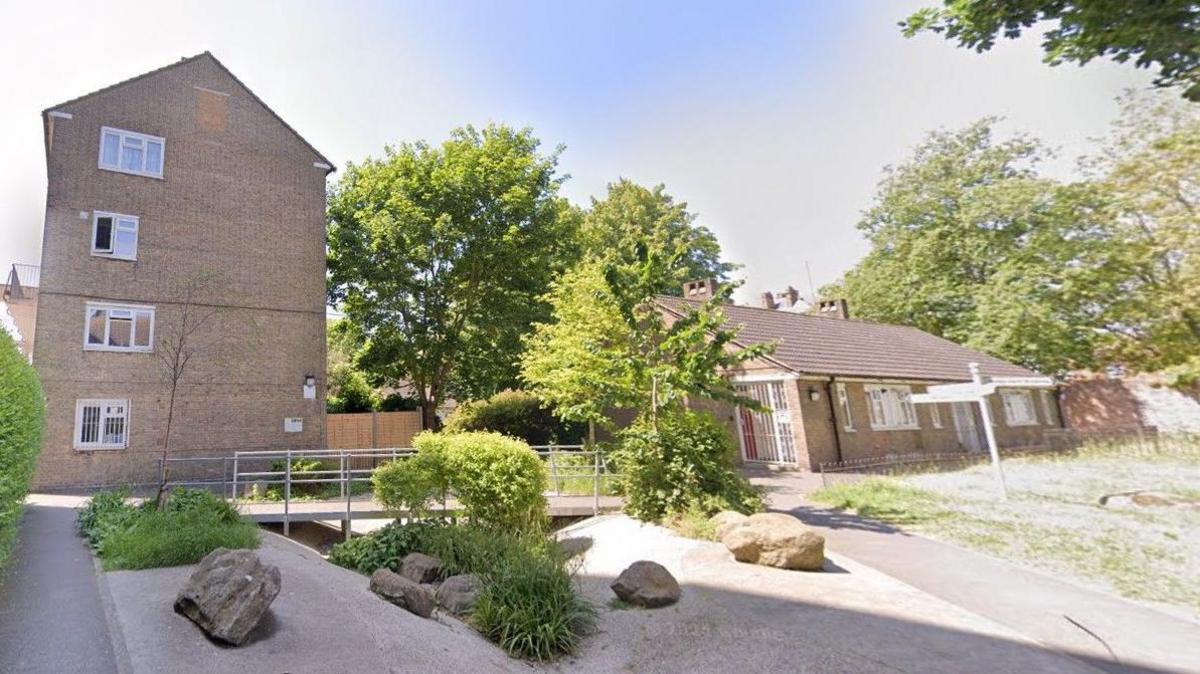
A detention basin at Queen Caroline Estate in Hammersmith - these are areas specifically designed to store excess water during heavy downpours
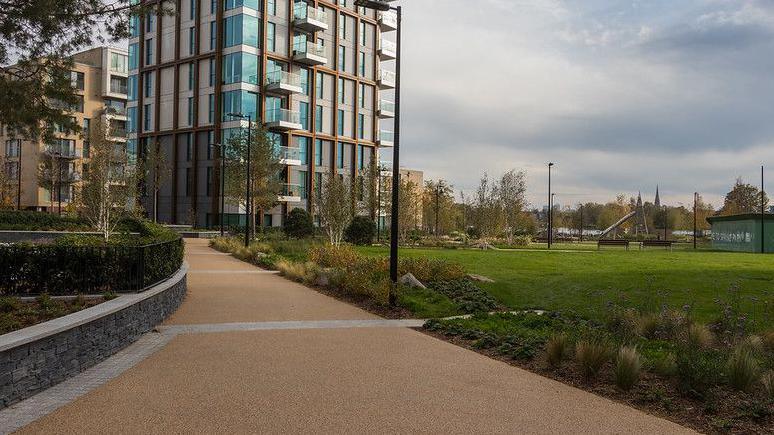
A permeable pavement in Hackney - this design allows rainwater to infiltrate the hard surfaces, while channels (grey areas) help direct water to the green spaces
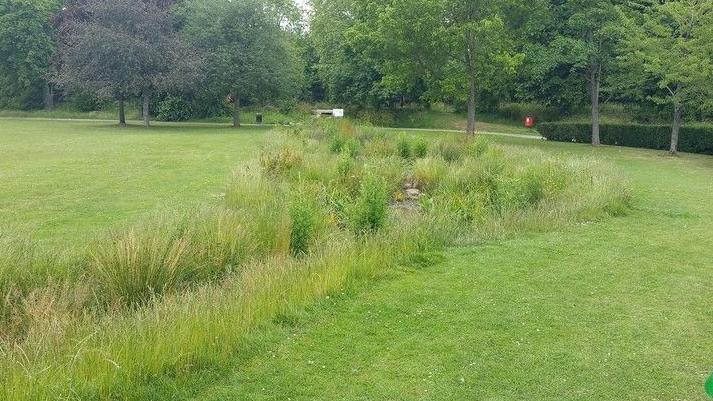
A swale in Enfield, north London. These are shallow channels designed to receive and store runoff during heavy rainfall
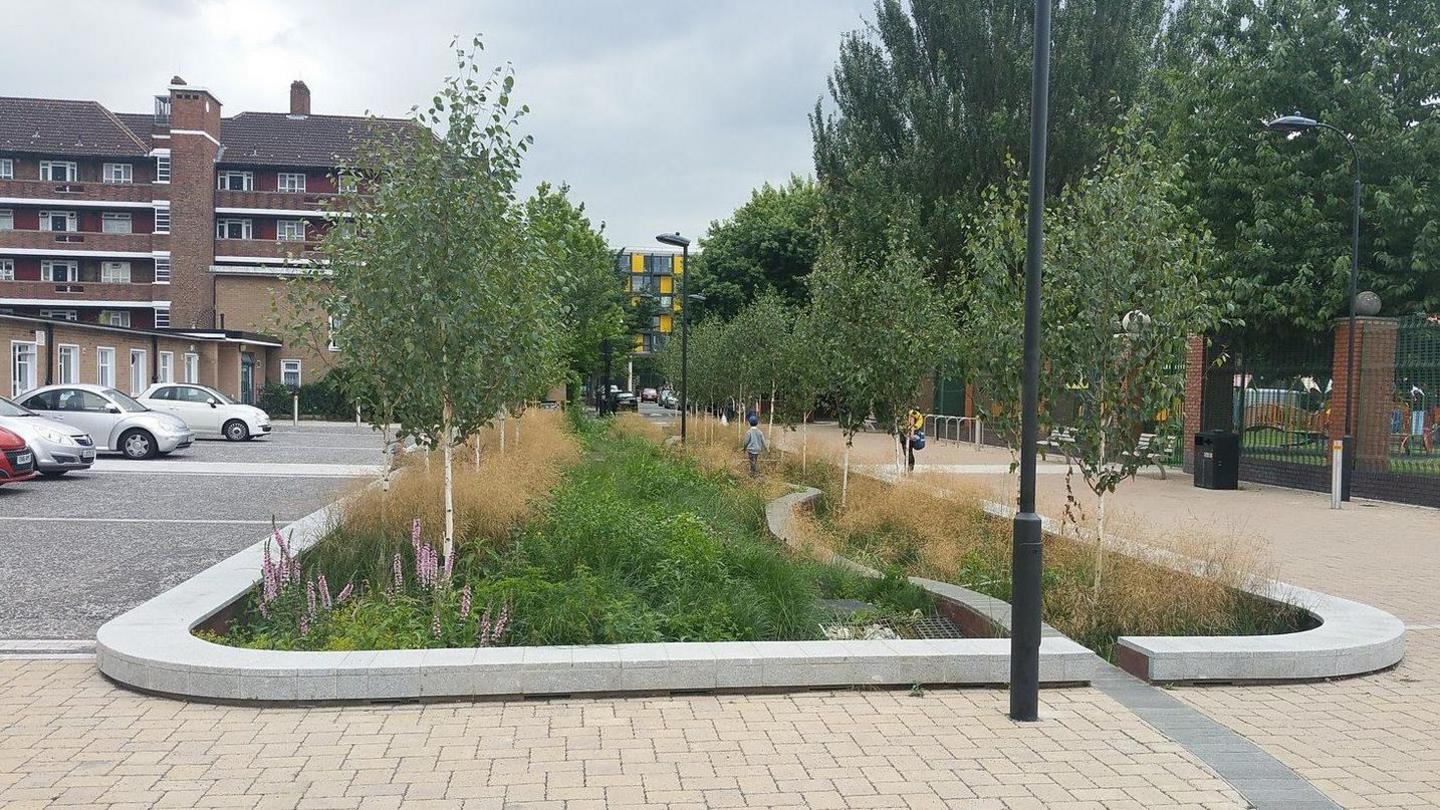
A combination system seen at Bridget Joyce Square in White City, west London. The main rain garden stores and filters rainwater, the pathway allows residents to walk through it and the surrounding permeable paving, coupled with channelled drainage from the nearby buildings, brings water into the structure
However, SuDS require investment, and any return on this takes many years and can be hard to quantify.
Detractors argue that SuDS take up valuable space for parking and their success relies on regular maintenance, which will rely on locals doing the necessary work.
London is also heavily built-up so creating new green spaces is not easy, and retrofitting them will sometimes prove unpopular.
What's being done?
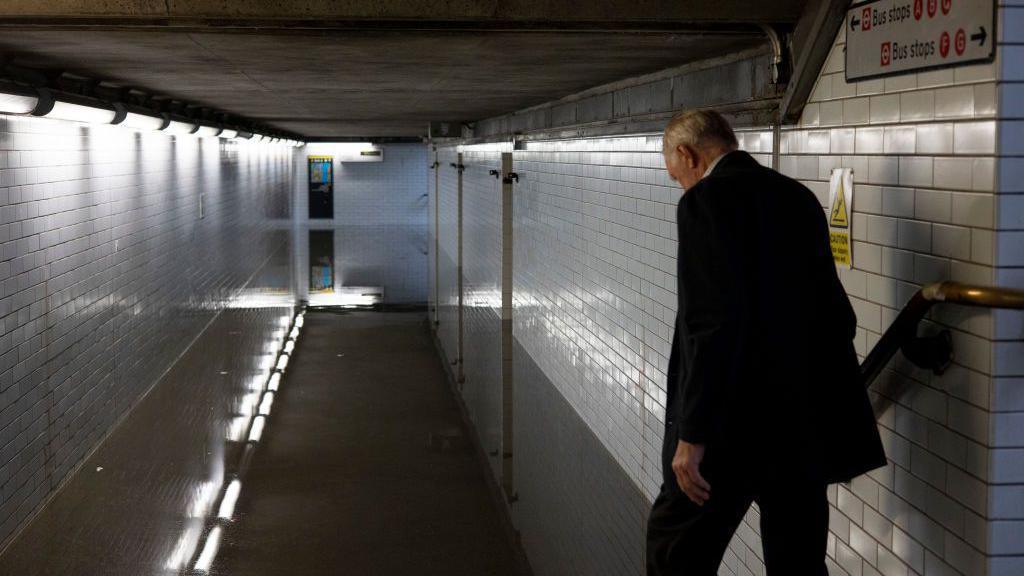
A flooded Westminster Tube station following heavy rain in August 2022
The damage from 2021 pushed City Hall to create a designated task force called the London Surface Water Strategy, external.
In the aftermath of the flooding, Thames Water commissioned an independent review and found a slew of failures, admitting it "let customers down".
Notably, the drainage system was easily overwhelmed and the "lack of effective communication" between key flood management organisations exacerbated the problems.
These findings led to stakeholders being brought together to create the strategy group - but the results won't be published until later this year.
Meanwhile, at the national level, the mandatory implementation of SuDS in new developments was supposed to be ratified into law in 2010 under Schedule 3 of the Flood and Water Management Act (FWMA), but this never happened.
SuDS implementation is therefore decided by the local council, external at a planning level.
Is this enough?
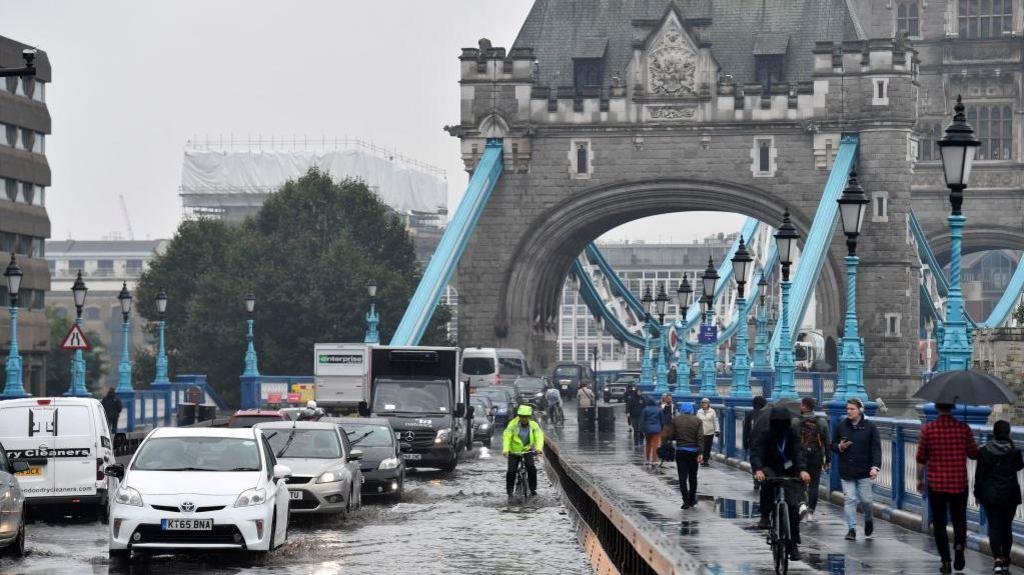
In 2022, Mayor Sadiq Khan created the London Climate Resilience Review, external to assess London's preparedness. Extreme weather is going to continue to affect the capital, according to the review - and not just flooding, but heatwaves, fire, rising sea levels and more, external.
While it found "significant climate adaptation and resilience action is under way" it said London was still "underprepared".
And as Prof Kenyon from the Met Office says, "the past is not a good indication of what's to come. So the current capacities of drainage systems aren't designed for the sort of increases in intensity we're expecting in the future."
This is a sentiment that is echoed by a number of organisations.
Alastair Chisholm, director of policy at the Chartered Institution of Water and Environmental Management (CIWEM), believes SuDS implementation has been lacking.
"I want to see SuDS on every street," he says.
Along with organisations such as the National Infrastructure Commission (NIC), CIWEM is advocating for the implementation of Schedule 3 - although Mr Chisholm thinks retrofitting existing spaces would go a long way towards helping London become a sponge city.
"This is one of the most deliverable solutions we can do," Mr Chisholm says, adding: "If we can retrofit a really small proportion of our towns and cities, we can hit an awful lot of sewage pollution problems, an awful lot of environment resilience problems, and bring back nature."
He is urging "all of our political leaders to really push the concept of sponge cities".
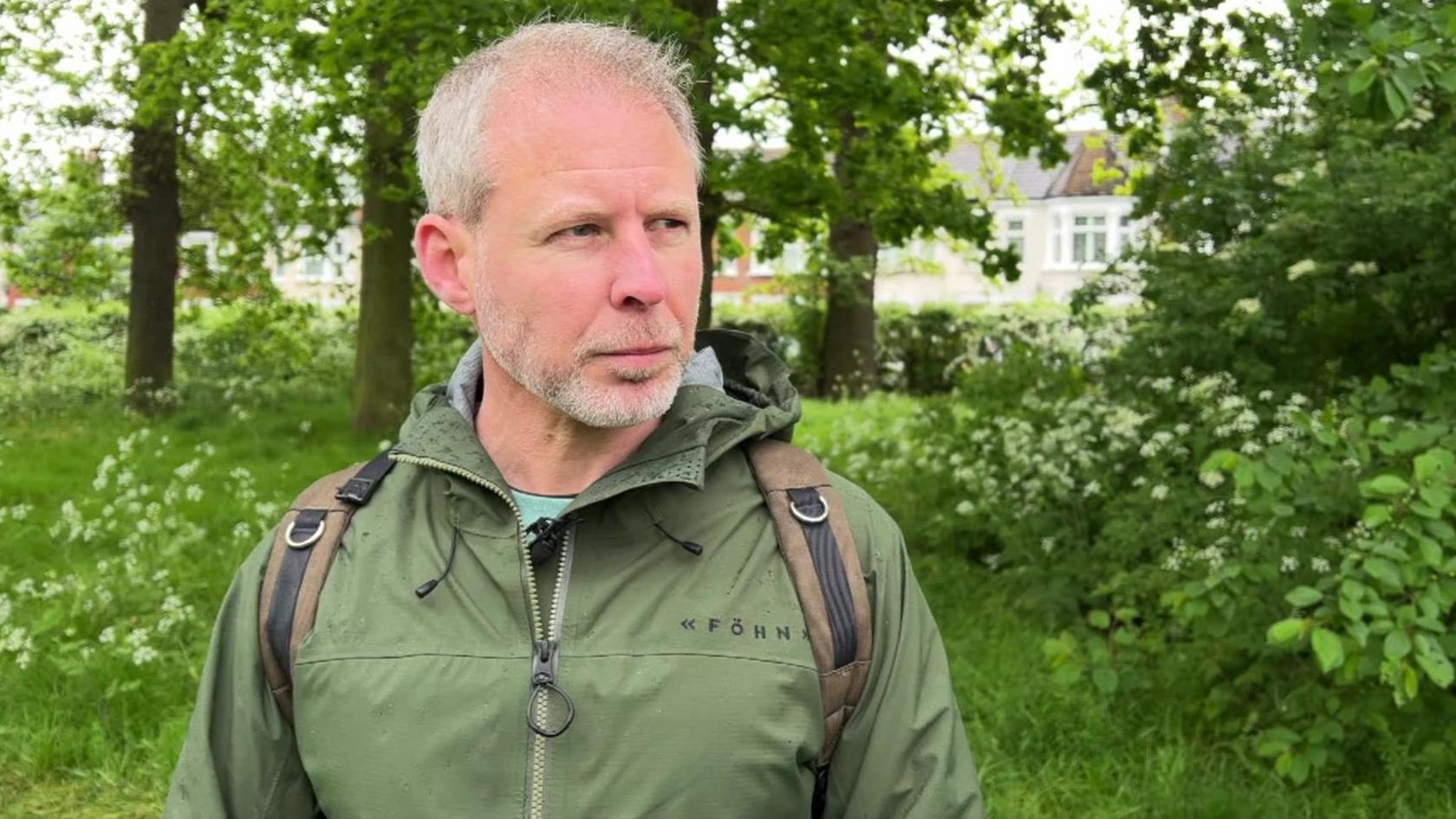
Alastair Chisholm says the additional benefits of SuDS make them a "no-brainer"
In response, the government said it was committed to tackling "all forms of flooding" and that an "implementation pathway" for Schedule 3 would be finalised.
However, the NIC said this response "does not meet the scale of the challenge, external" and "lacks the urgency required to meet the threat".
In the 14 years it's taken the government to begin considering the implementation of mandatory SuDS, the 10 warmest years in the historical record have all occurred, external. This added heat is intensifying heavy rainfall.
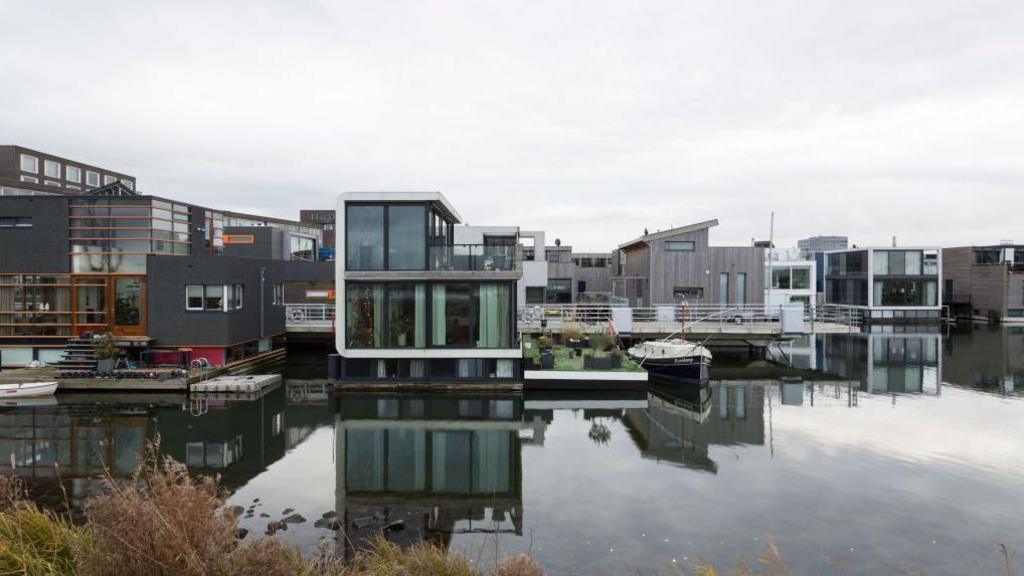
To combat a housing shortage and flood risk, Amsterdam has built floating homes that bob up and down with the changing water level
Looking at China - where the sponge city concept started - some studies found it worked well, external, while critics have questioned, external its effectiveness in dealing with major events.
Others, external found some sponge city projects failed because they were deployed as a monolithic strategy instead of accounting for local environmental differences.
Adopting the sponge city concept, but tailoring it for local physical and climatic conditions can be seen across the world; from Copenhagen's climate park, external that stores storm water and Amsterdam's floating houses to deal with rising water levels, to Kuala Lumpur's highway that becomes an overflow tunnel, external in floods.
In London, alongside the wealth of SuDS options, sponginess can be boosted by de-paving driveways and patios, creating more parks, collecting rainwater, planting more trees and adequately maintaining existing sewage networks.
The idea of London becoming sponge city has been backed by independent bodies like CIWEM.
But maybe the question isn't should it become one, but could it?
Prof Charlesworth is not hopeful: "As a concept, sponge cities is great; the issue is with its implementation."
A further review, external into China's efforts found that a successful sponge city needed significant investment and for it to work along with a collaborative change in mindset.
It found that the barriers to success were "social, institutional and political, rather than technical".
Furthermore, sponge cities have been criticised, external for being designed to deal with the present, when they should be looking to deal with future changes.
Prof Charlesworth believes this would be an issue in the UK, too, saying: " I don’t think the government - of whatever colour - could demand such a change."
But she admits that simply simply developing more large-scale infrastructure isn't the way forward: "A bigger pipe is not the answer to bigger storms."
Either way, as the government looks to create SuDS legislation and City Hall tries to devise a surface flooding plan, the issue of how to deal with the challenges posed by climate change is not going away.
Follow BBC London on Facebook, external, Twitter, external and Instagram, external. Send your story ideas to hellobbclondon@bbc.co.uk, external
- Published27 March 2024

- Published17 January 2024
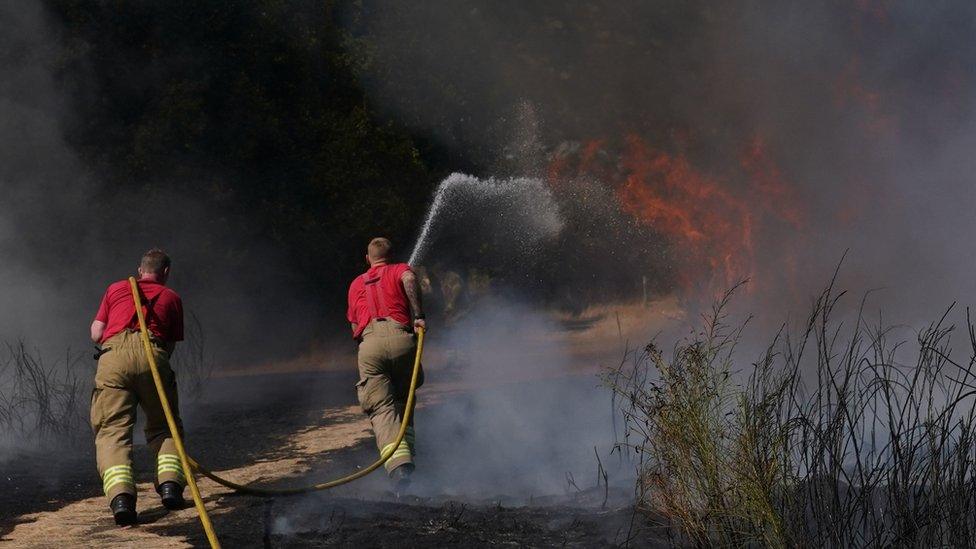
- Published16 March 2023
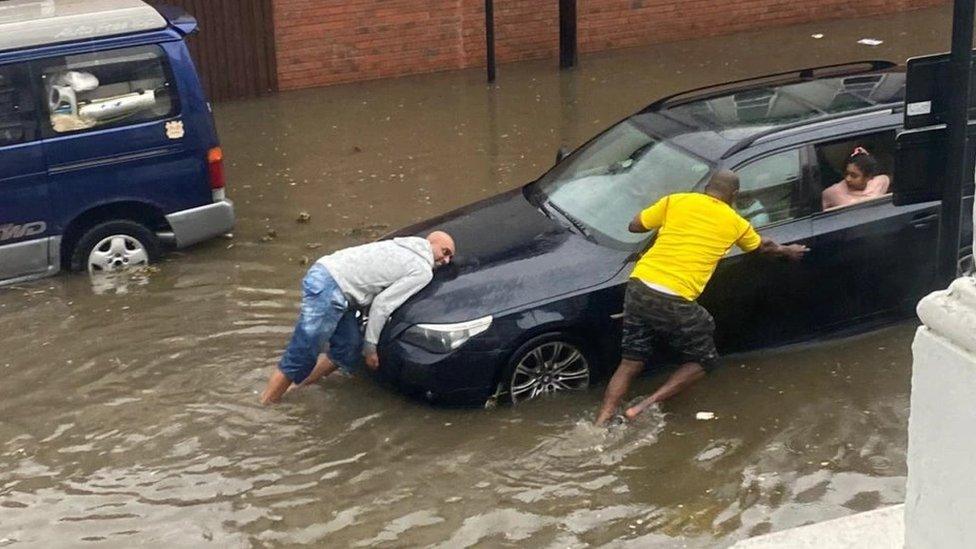
- Published14 July 2020
